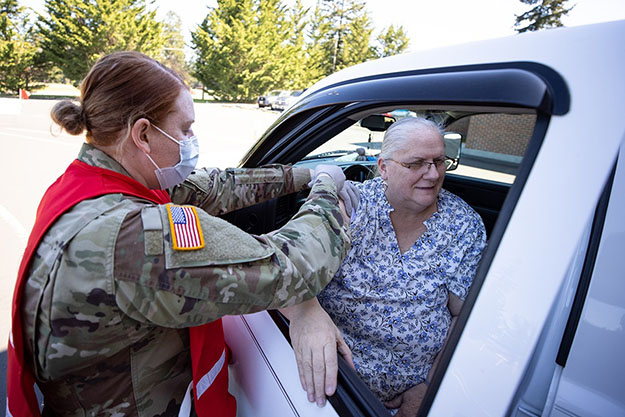MADIGAN ARMY MEDICAL CENTER - When Dena Curtis worked her way through the stations of the drive-thru COVID-19 vaccination site on a gloriously warm and sunny early spring day in the Pacific Northwest, a mix of emotions was her noticeable passenger.
"My husband and I, we talked about the vaccine, about getting it as soon as they finally came out with them and we were eligible for them. We were planning on getting them right away. I got an infusion and I believe that's what helped me recover as quick as I did. Everett, unfortunately, because of his lungs, they were so badly damaged, it just took him."
Everett is an understandably palpable presence in a conversation with Curtis.
When Curtis got COVID in January, it sapped her energy and robbed her of her sense of taste and smell, as it has so many of its victims.
"I have lingering effects, even though I had a mild case. COVID stole my sense of smell and my sense of taste completely, so bad that I cannot smell skunks. Nothing at all has come back. There's one thing I can taste- it's black licorice from Australia. It's so strong that actually I can smell it and I can taste it. That is the only thing so far. I still have some brain fog, like it's really hard to concentrate. One of the worst symptoms I had was absolutely extreme exhaustion. I have never been that tired in my whole life. It just seems like I haven't been 100% since. The only time I felt really, really good was like four days after I got that infusion. It was like, ‘Wow, nothing hurts!' They gave me steroids with it - monoclonal something."
But, being an otherwise healthy woman in early retirement, she recovered easily enough. Everett did not.
"I got it, had a super mild case, gave it to him. He had severe emphysema, he was in end stage. He died about 15 days later."
Curtis was married to the retired supply sergeant for decades. They traveled the world together and had a family, while working for the military.
"His last posting was here with 4th Brigade, with Headquarters Company. He was 20 years in the military; he got out in '91. Then he worked as a military contractor for the next 20 years. And he got me into working for the military as a military contractor. He couldn't come with me, his clearance didn't come through and mine did, so I went to Greenland for two years."
Originally from southern Oregon, the pair spent much of the 20-plus years Everett was on active duty here in Washington.
"He was here 20 plus years, most of his time, when he wasn't overseas. He was very comfortable with this area," Curtis noted.
As Everett received treatment, they looked forward to getting the vaccine.
"The reason we were going to get the shots, was we felt the only way for this disease to be gone, or at least under control, is if everybody gets vaccinated as soon as they can because we can't stop this disease if we don't. We just felt it's not going to go away if people don't get vaccinated," insisted Curtis.
Surviving COVID is bittersweet for Curtis. She expresses her gratitude for each passing day, but there is a sorrow in her voice that comes when someone finds themself alone after years of having someone by their side.
"I wish my husband was here right now to be able to enjoy this absolutely beautiful weather. We used to go for long drives when it was beautiful weather like this," Curtis mused.





Read Comments